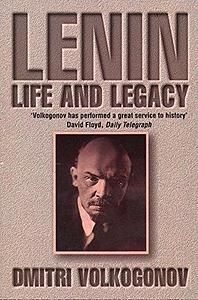Take a photo of a barcode or cover
A very different viewpoint on Lenin from that of Service. The perfect bio to contrast as such. Though a little trickier to follow than Services account. This provided many other juicy details for me to consume.
I came to this book from a relatively ignorant starting point regarding Russian history in general and Lennin’s history in particular. I chose it because I wanted the perspective of a Russian native born and raised there instead of a western perspective.
Unfortunately, the book proved too dense in minute details for a layman such as myself and left some key questions unanswered, first among them how it was possible for Lenin to get a hold on power within the Bolsheviks. The author only tells us that Lenin accomplished this by “writing” and because he possessed a “powerful intellect” and a “formidable will”.
Another mayor question left unanswered is why Lenin chose to so delivery replicate the Jacobin experience, knowing the disastrous results that it lead too, specially the deaths of all of the Jacobin leaders he was imitating, the institution of the Napoleonic dictatorship, the defeat of France and the death of millions of Frenchmen.
Another issue is the format, unusual for a Biography, focusing on specific topics instead of a purely year by year narrative. For example, he will write a chapter about the treatment of the Intelligentsia, another one about the treatment of the priests, then several chapters about each of Lenin’s close collaborators, etc.
All that said, this is an interesting perspective for an academic studying Russian history, especially for the profuse quoting of party documents and the insider remarks (the author worked at a high level in the soviet Government), but I would not recommend it for a casual reader such as myself.
Unfortunately, the book proved too dense in minute details for a layman such as myself and left some key questions unanswered, first among them how it was possible for Lenin to get a hold on power within the Bolsheviks. The author only tells us that Lenin accomplished this by “writing” and because he possessed a “powerful intellect” and a “formidable will”.
Another mayor question left unanswered is why Lenin chose to so delivery replicate the Jacobin experience, knowing the disastrous results that it lead too, specially the deaths of all of the Jacobin leaders he was imitating, the institution of the Napoleonic dictatorship, the defeat of France and the death of millions of Frenchmen.
Another issue is the format, unusual for a Biography, focusing on specific topics instead of a purely year by year narrative. For example, he will write a chapter about the treatment of the Intelligentsia, another one about the treatment of the priests, then several chapters about each of Lenin’s close collaborators, etc.
All that said, this is an interesting perspective for an academic studying Russian history, especially for the profuse quoting of party documents and the insider remarks (the author worked at a high level in the soviet Government), but I would not recommend it for a casual reader such as myself.
God what a dreary book...although that may have as much to do with the subject matter as the writing
